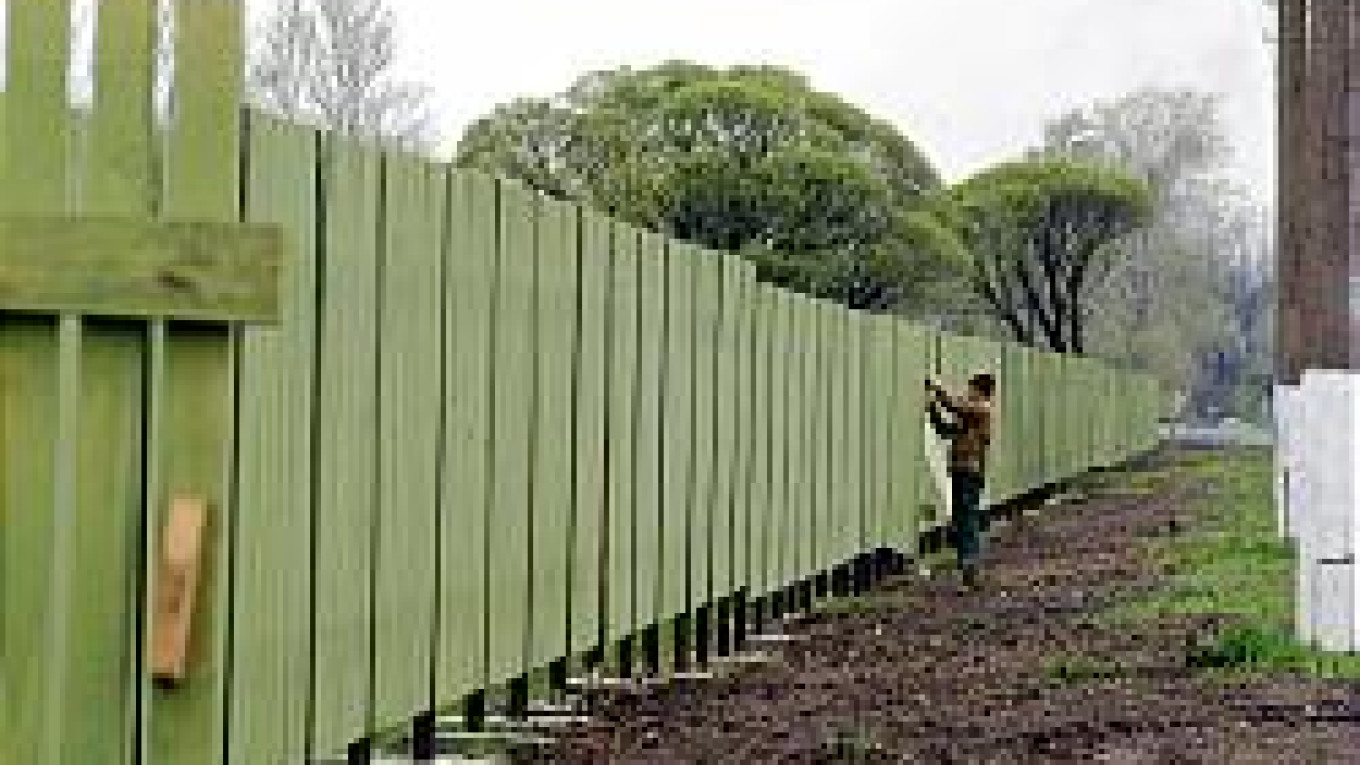The new 2-meter-high fence is an official attempt to hide Laar's shabby house, built a hundred years ago, from the thousands of foreign dignitaries who will be passing along this route from Pulkovo Airport to the imperial Konstantinovsky Palace, where President Vladimir Putin will host two summits to coincide with his native city's 300th anniversary celebrations.
"We're already getting used to it," Laar said in an interview last week. "We're a generation that was brought up behind a curtain, so if something is done to us [by officials], we think that's the way it should be. ... They've fueled the poverty themselves and now they want to hide it."
Laar said she was told by officials not to open her gate while the foreign delegations pass and not to use her car from May 20 to June 1.
All along the highway, Volkhonskoye Shosse, eyesores such as decrepit villages, garbage dumps, sewage reservoirs, construction sites and even a cemetery have been fenced off. Those who come to pay their respects at the local graveyard climb under the fence to cut down on travel time.
Yury Kolembet, director of Cosmos, a private developer contracted to clean up around the palace, said the request to fence off unattractive areas came from the federal authorities and said the fence would only do St. Petersburg good.
"We're doing it to make the northern capital look better, and people here like it. Pensioners and old people are happy because they see that the federal authorities care about them. We haven't had any complaints," Kolembet said, adding that the fence would be 10 kilometers long.
But others say opinion is split. "Some say it looks like [a native American] reservation," said Tatyana Zhitkova, a middle-aged resident of Volodarsky, a village also on Volkhonskoye Shosse.
"The people who installed it told me we'd have to look after it and, if something was stolen, replace it at our own expense. Why? I didn't need this fence. This is none of my [expletive] business," said a resident who refused to give his name.
Last week, workers walked around with cans of green paint, putting the finishing touches on what locals have described as a Potemkin village, referring to the elaborate fake villages allegedly built in the 18th century by Prince Grigory Potemkin to impress Catherine the Great during her tour of Ukraine and to prove to her how well her people were living.
Although many have snickered and sighed over the fence, other residents in the Strelna area have been even less fortunate: The eyesores they owned weren't just covered up, they were burned down.
A number of people who tend garden plots on municipal land along Peterburgskoye Shosse, which also runs past the new presidential residence at the Konstantinovsky Palace, say the small tool sheds they had erected were torched on the orders of local officials.
In both cases, bureaucrats have pointed the finger at one other.
A Strelna official said the fires were the fault of overzealous officials in the Petrodvortsovy district who wanted to "beautify" the area overnight.
"If we followed this reasoning, we'd have to burn down half of Russia," said Gennady Lebedev, head of Strelna's municipal maintenance committee.
District officials could not be reached for comment this week, but Lebedev said a number of gardeners had filed suits against the district administration, in some cases seeking damages as high as 200,000 rubles (about $6,450).
"People are very practical, you see. They say that they had a color TV and a [satellite] television system in the sheds," Lebedev said.
Officials accused of standing behind the fence-building have also been actively passing the buck, with municipal bureaucrats saying they got their orders from St. Petersburg City Hall and city officials claiming the directive came from the Kremlin.
Viktor Khrekov, spokesman for the presidential property management office, which is responsible for reconstruction at the palace, said the area around Putin's new presidential residence was no concern of his department.
"We are responsible for the Konstantinovsky Palace, not for garbage dumps and villages," Khrekov said by telephone. "This [the fence] is not a question for us, but for the local administration. It would have been better to do everything as it should have been done, instead of building Potemkin villages."
A Message from The Moscow Times:
Dear readers,
We are facing unprecedented challenges. Russia's Prosecutor General's Office has designated The Moscow Times as an "undesirable" organization, criminalizing our work and putting our staff at risk of prosecution. This follows our earlier unjust labeling as a "foreign agent."
These actions are direct attempts to silence independent journalism in Russia. The authorities claim our work "discredits the decisions of the Russian leadership." We see things differently: we strive to provide accurate, unbiased reporting on Russia.
We, the journalists of The Moscow Times, refuse to be silenced. But to continue our work, we need your help.
Your support, no matter how small, makes a world of difference. If you can, please support us monthly starting from just $2. It's quick to set up, and every contribution makes a significant impact.
By supporting The Moscow Times, you're defending open, independent journalism in the face of repression. Thank you for standing with us.
Remind me later.


